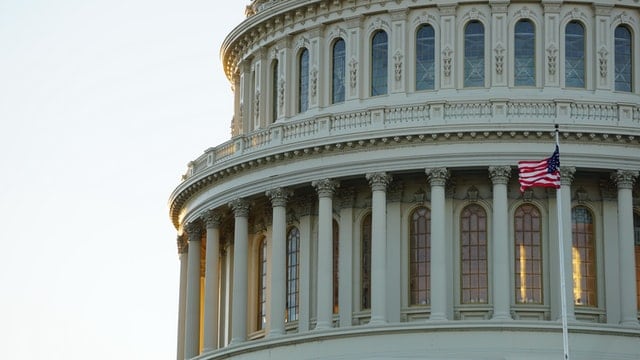
Jason Vazquez is a staff attorney at the International Brotherhood of Teamsters. He graduated from Harvard Law School in 2023. His writing on this blog reflects his personal views and should not be attributed to the Teamsters.
Following months of bipartisan negotiation and a weekend of grueling procedural advances, the Senate yesterday approved an expansive $1.2 trillion infrastructure package. The sprawling bill — slated to pour hundreds of billions of dollars into rebuilding roads, airports, and railways, upgrading public transit systems, modernizing the power grid, and expanding broadband access — amounts to the largest investment in the nation’s crumbling infrastructure in decades.
The news delivers a significant political boost to President Biden, appearing to vindicate his campaign messaging that he would prove uniquely capable of forging bipartisan consensus. Yet the cost of bipartisanship was steep — the GOP managed to extract significant concessions, forcing Democrats to discard transformative elements of Biden’s ambitious vision to remake the nation’s public transit, healthcare, and energy grid.
Still, despite its considerable trimming, labor groups have voiced support for the package, saying it promises to “uplift millions of working families through good unions jobs.” Labor Secretary Marty Walsh expressed a similar sentiment yesterday, describing the bill’s passage as “great news for workers, families and communities across the nation.”
The bill now goes to the house, where it is poised to encounter a degree of resistance but ultimately projected to pass. Several members of the House Progressive Caucus have signaled they intend to withhold support from the measure until the Senate approves the separate “big, bold” $3.5 trillion budget framework that seeks to vastly expand the nation’s patchwork social safety net. In an effort to preempt this push, Senate Majority Leader Chuck Schumer (D-NY) yesterday assured those concerned the package does not do enough to address climate change or economic inequality that the Senate is “moving on a second track” to “make a generational transformation in those areas.” To that end, early this morning Democrats in the chamber approved a framework for the budget bill, touching off what will surely descend into a protracted legislative struggle.
An EPI report published Tuesday reveals that compensation for top executives at the country’s largest public firms has skyrocketed by over 1,300 percent since the ascent of the neoliberal consensus in the late 1970s — sharply eclipsing income growth for even the top 0.1 percent of wage earners. Indeed, the report spotlights that CEO pay continued to soar even as millions of workers were plunged into economic precarity during the pandemic.
Of course, it is no secret that CEOs at the largest corporations rake in grotesque salaries. Still, EPI’s report underscores that even in the face of renewed populist hostility to economic inequality, the stunning disparity between executive compensation and worker wages— the root of so much social dysfunction — continues to escalate.
Lastly, Tex. Gov. Greg Abbott (R) convened a special session of the Texas legislature last weekend aiming to block municipalities from requiring that employers provide paid sick leave, a measure several of the state’s major cities — including Austin, Dallas, and San Antonio — recently instituted.






Daily News & Commentary
Start your day with our roundup of the latest labor developments. See all
January 30
Multiple unions endorse a national general strike, and tech companies spend millions on ad campaigns for data centers.
January 29
Texas pauses H-1B hiring; NLRB General Counsel announces new procedures and priorities; Fourth Circuit rejects a teacher's challenge to pronoun policies.
January 28
Over 15,000 New York City nurses continue to strike with support from Mayor Mamdani; a judge grants a preliminary injunction that prevents DHS from ending family reunification parole programs for thousands of family members of U.S. citizens and green-card holders; and decisions in SDNY address whether employees may receive accommodations for telework due to potential exposure to COVID-19 when essential functions cannot be completed at home.
January 27
NYC's new delivery-app tipping law takes effect; 31,000 Kaiser Permanente nurses and healthcare workers go on strike; the NJ Appellate Division revives Atlantic City casino workers’ lawsuit challenging the state’s casino smoking exemption.
January 26
Unions mourn Alex Pretti, EEOC concentrates power, courts decide reach of EFAA.
January 25
Uber and Lyft face class actions against “women preference” matching, Virginia home healthcare workers push for a collective bargaining bill, and the NLRB launches a new intake protocol.